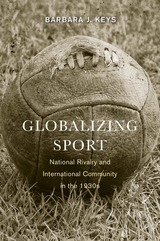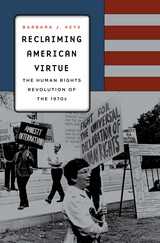
In this impressive book, Barbara Keys offers the first major study of the political and cultural ramifications of international sports competitions in the decades before World War II. She examines the transformation of events like the Olympic Games and the World Cup from relatively small-scale events to the expensive, celebrity-packed, politically resonant, globally popular entertainment extravaganzas familiar to us today. Focusing on the United States, Nazi Germany, and the Soviet Union, she details how countries of widely varying ideologies were drawn to participate in the emerging global culture. She tells of Hollywood and Coca-Cola jazzing up the 1932 Olympic Games in Los Angeles, of Hitler crowing over the 1936 Berlin games, and of the battle between democracy and dictatorship in the famed boxing matches between Joe Louis and Max Schmeling. Keys also presents one of the best accounts to date of the Soviet relationship to Western sports before the rise of the “big red sports machine.”
While international sport could be manipulated for nationalist purposes, it was also a vehicle for values—such as individualism and universalism—that subverted nationalist ideologies. The 1930s were thus a decade not just of conflict but of cultural integration, which laid a foundation for the postwar growth of international ties.

The American commitment to international human rights emerged in the 1970s not as a logical outgrowth of American idealism but as a surprising response to national trauma, as Barbara Keys shows in this provocative history. Reclaiming American Virtue situates this novel enthusiasm as a reaction to the profound challenge of the Vietnam War and its tumultuous aftermath. Instead of looking inward for renewal, Americans on the right and the left alike looked outward for ways to restore America’s moral leadership.
Conservatives took up the language of Soviet dissidents to resuscitate a Cold War narrative that pitted a virtuous United States against the evils of communism. Liberals sought moral cleansing by dissociating the United States from foreign malefactors, spotlighting abuses such as torture in Chile, South Korea, and other right-wing allies. When Jimmy Carter in 1977 made human rights a central tenet of American foreign policy, his administration struggled to reconcile these conflicting visions.
Yet liberals and conservatives both saw human rights as a way of moving from guilt to pride. Less a critique of American power than a rehabilitation of it, human rights functioned for Americans as a sleight of hand that occluded from view much of America’s recent past and confined the lessons of Vietnam to narrow parameters. It would be a small step from world’s judge to world’s policeman, and American intervention in the name of human rights would be a cause both liberals and conservatives could embrace.
READERS
Browse our collection.
PUBLISHERS
See BiblioVault's publisher services.
STUDENT SERVICES
Files for college accessibility offices.
UChicago Accessibility Resources
home | accessibility | search | about | contact us
BiblioVault ® 2001 - 2024
The University of Chicago Press









